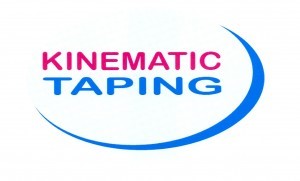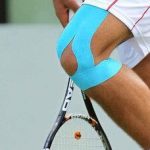The seminar is addressed to Physiotherapists, Occupational Therapists, Doctors, Gymnasts and other Health Professionals.
Course’s language will be Greek.
LLLC, EPIMORFOSIS intends to organize a Kinematic Taping® Concept seminar with Professor Evripidis Triantafyllou.
The seminar lasts 2 days and will be held in Thessaloniki.
The cost of the seminar is 270€.
To finalize your participation, the amount of 120€ must be prepaid.
The remaining amount of 150€ must be deposited at least 2 days before the beginning of the seminar.
Participants are issued a certificate of participation recognized by IKTA.

McConnell
In the eighties, the Australian manipulative physiotherapist Jenny McConnell introduced the non-elastic taping in the manipulative Therapy. McConnell´s tape applications meet the current standards of assessment and treatment principles of physical therapy and are evidence-based.
Kase
Also in the eighties, the Japanese chiropractor and kinesiologist Kenzo Kase developed his taping with elastic adhesive bandages for the use on the skin. His tape mimics the properties of the skin without using an underwrap for skin protection. This type of taping was known as kinesiological or Kinesio Taping®.
The application of elastic tape according to kinesiologist Kase became known as Kinesio Taping. It got to be well-known at the Olympic Games 2000 and the FIFA World Cup 2002 in Korea and Japan. Meanwhile, coloured tape applications expose on television globally every day in Sports events, as the elastic tape can be used in a wide variety of indications
Kinemating Taping
Dutch OMT physical therapist John Langendoen introduced in the elastic taping, while he was working for the Korean National football team at FIFA world cup of Corea/Japan 2002, who was applying rigid, non-elastic tape for years, according to Jenny McConnell.
However, in the FIFA World Cup in 2006 where John Langendoen and a group of colleagues and doctors developed a theory applying elastic tape – Kinematic Taping, or simply KT, according to the principles of neuromusculoskeletal/orthopaedic manual physical therapy.
KT applications are generally no substitutions for passive techniques or active training, however are used in addition to enhance the effect of the actual effective therapy. KT is an integral part of the overall management and therefore the positive effect of the application can be foreseen: “success is program”
Since 2006 the application of elastic adhesive bandages, in line with western principals of sports physiotherapy / medicine and orthopaedic manipulative physiotherapy / medicine, developed to a conceptual approach of functional taping with elastic tape, known as Kinematic TapingR Concept leading by John Langendoen.
All teachers of IKTA are clinicians with an academic background: all of your questions will be answered in our seminars.
Characteristics of the theory of Kinematic Taping:
- based on assessment
- with neuro-musculo-skeletal content
- Situation-spesific
- Patient-centered
- supported by scientific evidence
- High academic level
Kinematic Taping Definitions:
Kinematic Taping is a complementary therapy concept applying high quality elastic adhesive bandages within assessment-related, patient-centred, evidence-supported overall management of somatic symptoms and movement disorders and within the scope of the actual paradigms in sports medicine and orthopaedic manipulative physiotherapy.
The theory of Kinematic Taping Concept :
Kinematic Taping: The dimension to functional elastic Taping.
In comparison with the assessment and management of nervous tissue in the 80s and the development of models of stabilization and motor control based on scientific data of the 90s, this first decade of the third millennium, neuro-musculoskeletal physiotherapy increasingly dominated by the issue of the elastic taping
Clinical developments and emerging scientific evidence is emphasising the role of taping in the scope of the (para-) medical management spectrum. Lymphatic taping, meridian taping, cross-taping are examples of this development, particularly in the Netherlands and Germany.
Orthopaedic Manipulative Therapy (OMT) profits enormously from tape applications: faster, better, lasting treatment effects. How specific elastic taping can be integrated in OMT shows Kinematic Taping®, a giant leap in functional elastic taping.
Untitled-12
Neuro-musculoskeletal dysfunctions commonly show negative interactions between joint, muscles, neural structures and correlating spinal segments. Structure specific, assessment related starting positions, and recognition of the dominant involved structures are the main characteristics of the Kinematic Taping® Concept (an analogy to the examination and treatment strategies in OMT).
The theory offers a reasonable ground and clear guidelines for additional management of neuromusculoskeletal dysfunctions, complying with all medical designs:
International Classification of Function, Disability and Health-ICF for WHO 2001: www.who.org),
Bio-psycho-social models of health and pathology
Guidelines for education of International Federation of Orthopaedic Manipulative Physical Therapists (IFOMPT), as described in rules document (IFOMPT 2008: www.ifompt.org)
The leading paradigm of Kinematic Taping® is an advanced level of Clinical Reasoning in analysing the movement disorder and deciding on and performing of management strategies.
Apart from local symptomatic tape applications, a main characteristic of Kinematic Taping® is enhancing the effect of passive techniques and or therapeutic training with taping applications that address the direct causes of the problem.
Further characteristics are consequent reassessment of the most relevant and specific functional tests, inclusion of evidence for tape applications, as well as for logical rationales for treatment and neurophysiological and or biomechanical explanations.
Kinematic Taping® does not make use of the Principles of Applied Kinesiology, however consequently applies the principles of examination and treatment of orthopaedic manipulative physiotherapy with an advanced level of clinical reasoning (5´T principle):
5T – Principle – Comprehensive learning contents
- 1.Think – Clinical Reasoning programmes success
- 2.Test – Most relevant problem related tests
- 3.Treat – Specific techniques and exercises
- 4.Tape – Applications in analogy to treatment
- 5.Train – Exercises in line with the applications
Day 1
08.30 Registrations
09.00 Introduction, Aims of the course, conceptual principles and basics of elastic taping interventions
10.30 Break
10.50 History and development backgrounds, characteristics of elastic material, colors, healing phases
12.30 Lunch
13.15 degree of dysfunction, management guidelines
15.30 Break
15.45 Basic applications / techniques
17.00 End of day 1
Day 2
09.00 Basic applications / techniques
10.30 Break
10.50 local symptomatic applications
12.30 Lunch
13.30 patient / clinical demonstrations
15.00 Break
15.20 Preview functional elastic taping: Kinematic Taping® Advanced module 1 and 2
16.00 End of day 2
1. Credit or Deposit card payment
You can deposit the down payment or the total fee via credit or deposit card (Visa, Mastercard & American Express) from the webpage of each course, through VivaPayments.
You are solely responsible for the proper entry and the genuineness of your credit/deposit card’s details. EPIMORFOSIS bears no responsibility in case of any error.
Any payment commission is charged to EPIMORFOSIS
2. Deposit – Transfer to our bank account.
You can deposit or transfer the requested amount for your registration to the following accounts, writing your full name in the field “Reason for the Beneficiary”:
PIRAEUS BANK:
ΙΒΑΝ: GR5501722380005238070348955
SWIFT(BIC): PIRBGRAA
NATIONAL BANK of GREECE:
IBAN: GR6801102170000021744103439
SWIFT(BIC): ETHNGRAA
ALPHA BANK :
ΙΒΑΝ: GR4801407080708002002013410
SWIFT(BIC): CRBAGRAA
EUROBANK:
ΙΒΑΝ: GR4502600370000010201090153
SWIFT(BIC): ERBKGRAA
Beneficiary: EPIMORFOSIS KENTRO EPIMORFOSIS STELECHON YGEIAS OE
The bank transfer fee charged to EPIMORFOSIS
1. A certificate of attendance, a degree or a diploma will be issued.
2. Printed handouts are provided (notes or relevant book).
3. In case of cancellation of the seminar due to EPIMORFOSIS’s responsibility, deposited fees will be refunded immediately.
4. EPIMORFOSIS reserves the right to change the date or postopone seminars, informing participants by phone and / or sms & e-mail. In such a case participants are entitled to request full refund of their fees if they do not wish to attend the seminar on the new date or to use this amount for their participation in other seminars or services of the company.
5. In the event of a strike, government’s bans, heavy bad weather, and generally any event beyond the reasonable control of the organisers which impedes the execution of part or all of the seminar, the organizers reserve the right to change the date and time of the event. In this case the fees are not refundable but are valid as they are.
6. Cancellation of participation due to participant’s responsibility is possible only by email, as follows:
• up to 30 days prior to the start of the seminar, all deposits are refundable.
• up to 15 days prior to the start of the seminar, 50% is refundable.
• no refund after this deadline, exceptions could be only by decision of EPIMORFOSIS.
7. The realisation of the course will be confirmed by email or/and sms to be sent to participants, in time.
8. It is advised to not buy your flight tickets until you receive this confirmation email (or/and sms).
9. LLC-1 EPIMORFOSIS keeps the right to change course venues.
Hotel Holiday Inn*****
More information:Tel.: +30 2310 563100

Kinematic Taping® Concept Lower Quadrant – ΘΕΣΣΑΛΟΝΙΚΗ 2025
€120.00 – €270.00
Training, a steady value for more than twenty years now, leads physiotherapy and keeps it at a very high level, well done to George Karambalis and his associates, we owe a lot to all of you.
EPIMORFOSIS organizes specialization seminars for rehabilitation professionals. I’ve watched a lot. I strongly recommend you trust EPIMORFOSIS for your specialization and lifelong information.
EPIMORFOSIS justifies its name by providing high quality courses. George Karampalis operates more like a constant “trainee” and less like an entrepreneur, and this is an additional positive fact in the effort that is put by the workers and teachers of EPIMORFOSIS.
I have known George Karampalis and EPIMORFOSIS for many years. I’ve had the opportunity to join several clinical courses and I can argue that, at the level of organisation and selection of trainers, they have a high level of recognised prestige.
My first steps in professional specialization started with EPIMORFOSIS and continue. It has been with us all these years, covering the need for modern and documented knowledge, in collaboration with internationally acclaimed educational institutions.
The best physiotherapists training institution. It enables the development of the necessary knowledge for clinical reasoning. High-quality training without having to travel abroad.


 Smart
Smart